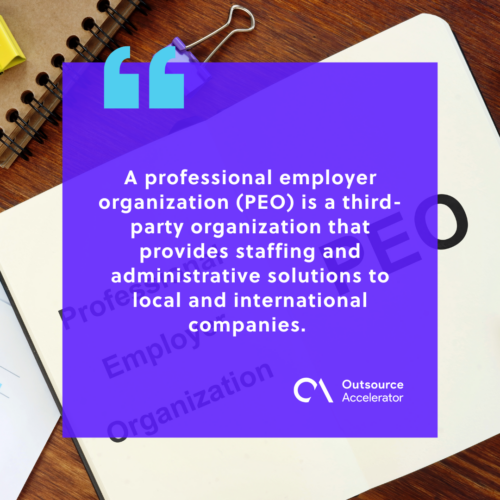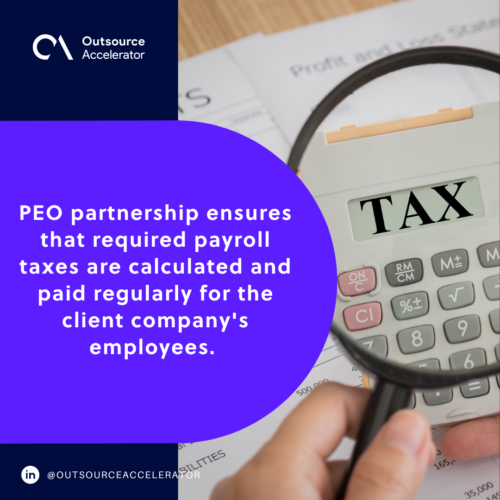Your guide to PEO partnership

Business growth and expansion is not as easy as it looks. The idea of stability and more revenues is enticing, but the legwork needed to build a global presence is daunting.
The different processes, regulations, and policies governing each country can be quite challenging, especially for the company’s finances.
But there are sure ways to manage business expansion through professional employer organizations (PEO) partnerships.
This article will tackle the nature, mechanisms, and other services included in PEO partnership.
What is a PEO partnership?
A professional employer organization (PEO) is a third-party organization that provides staffing and administrative solutions to local and international companies.
Legally, it acts as the employer, on behalf of its client, for its workforce anywhere in the globe.
Instead of putting up a physical company in a foreign country, multinationals and soon-to-be MNCs undergo a PEO partnership instead to operate in that country.
PEO’s services include payroll processing, HR solutions, recruitment, benefits management, and taxation. The range goes on depending on the needs of the client company.
When it comes to employee benefits, PEO partnerships are valuable as they allow even small companies to offer competitive benefits packages.
Various organizations and companies have availed and benefited from this arrangement. It ranges from large corporations, small to medium-sized companies, even startups, and most importantly, freelance workers.

How does a PEO partnership work?
PEO partnership transpires between a local PEO company and a client company looking to operate in the area of the professional employer organization.
The company pays the PEO all the operational expenses and a retainer fee. In return, PEOs directly hire these employees and handle all their administrative requirements.
This includes payroll, benefits, and government-mandated taxes. In some cases, client companies also include retirement plans.
On the other hand, the employees report directly to the client. The client handles everything from daily tasks and reports to job evaluations.
The company does not need to pay taxes and other necessary fees that companies with physical setups need to comply with.
Firms save a lot from the arrangement since a PEO provides efficient and cost-effective employment arrangements.
For matters regarding employee benefits administration, the PEO manages health insurance, retirement plans, and perks, leveraging expertise and bargaining power to offer competitive packages.
Further, the PEO acts as a payroll service provider. They handle payroll processing, file taxes, ensure labor regulation compliance, and streamline administrative tasks for client companies.
In other countries, PEOs are referred to as co-employers. Essentially, the function is the same. It is the terminology alone that is quite different.
Lastly, the professional employer organization partnership contract determines the scope and breadth of responsibilities a PEO company has.
Difference between a PEO partnership and an umbrella company
A PEO partnership involves a company outsourcing specific human resources services to a professional employer organization.
Firstly, umbrella companies are unique to the UK. This is because of the complicated nature of labor laws created by the former Queen Elizabeth.
With this in mind, it solely functions in the UK system and might be difficult to replicate in other countries.
Secondly, umbrella companies hire professionals who work under seasonal contracts, often through recruitment agencies.
This complicates the employment structure as the payment must be coursed through the recruitment agency before it is released to an umbrella company.
The same goes for the billing process. Umbrella companies cannot directly bill the client company, it needs to go through the recruitment agency.
This arrangement essentially reduces the liability of the recruitment agency.
Lastly, umbrella companies do not offer full-suite administrative employment responsibilities, the same way it goes under a PEO partnership.
Choosing between two options depends on desired involvement in HR functions and extent of needed risk management support.
Business owners must consider their specific requirements for HR services and risk mitigation when deciding between a PEO partnership and an umbrella company.
Common global professional employer organization services
PEO companies offer various services. Local PEO companies have limited reach and scope compared to global PEOs. Global PEOs often have a wider range of services, allowing for expansion.
The specific services that a PEO company provides is determined by the agreement set in the service contract with the client company.
The usual services they offer include the following:
Human Resources
One of the advantages of professional employer organization partnerships is they have been in the local setting for quite some time.
They already know the local laws and regulations, making it easier for the client company to operate.
Any HR-related concerns and processes are covered from compliance, onboarding, and even severance pay.
Another good thing with them is that they can create labor contracts consistent with local and national guidelines.
Risk and compliance services
Risks are normal during business expansion. If not managed properly this can deplete the resources of a company.
The good thing about global PEOs is that it mitigates the risks involved in expanding the business.
Startups and small to medium enterprises can easily expand as PEOs have a good grasp of the local risks.
Some of the usual dangers include the management of employee complaints, workers’ compensation, workplace safety needs, and other local labor policies.

Best examples are:
- Misclassification of work status. Workers that have been tagged as individual contractors when they are employees could spell huge pay back-taxes and other legal complaints. PEOs assuage this, given their knowledge and expertise with local regulations. No penalties need to be paid.
- Income taxes. Normally, businesses with permanent establishments in a country will need to pay annual taxes to the government. Global PEOs solve this issue by complying with some local guidelines.
Tax
PEO partnership ensures that required payroll taxes are calculated and paid regularly for the client company’s employees.
This ensures that relevant deductions are made based on local country guidelines and that the business has a good track record.
Why choose the PEO partnership?
One of the major advantages of a PEO partnership is that market entry is faster and easier. Typically, it is resource and time intensive to do a foreign expansion.
The lack of familiarity with local laws and regulations and the existence of various risks, such as competition and employee-related concerns, will test a company’s resilience.
PEO partnership allows companies to just focus on doing business. All the administrative and legal burdens are covered by a PEO.
It will also be a good gauge for the company to do a dry run of the country before making a full investment. This way, risks are calculated to a bare minimum.







 Independent
Independent




